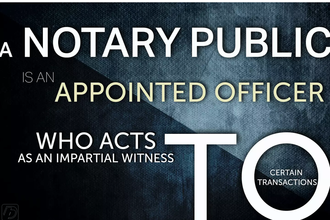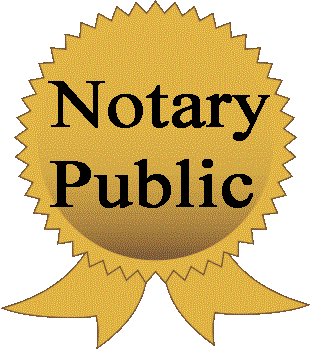 Notaries authenticate the identity of document signers. Notaries are appointed public officials who help ensure the integrity of signatures on important documents. A notary public verifies the identity of somebody who signs a document, witnesses the signature, affixes the notary seal to the document and then records the signing in her notary journal. The scope of practice of a notary public, as well as the amount of money he can charge for services, varies according to state. The types of documents that need notarized signatures include, legal documents divorce agreements, letters, consent to travel forms, deeds and trust documents as well as some contracts. Why have a document Notarized? For "Self-Authenticating." What is self-authenticating? A self-authenticating document, under the law of evidence (Rule Number 902) in the United States, is any document that can be admitted into evidence at a trial without proof being submitted to support the claim that the document is what it appears to be. Several categories of documents are deemed to be self-authenticating: Certified copy of public or business records; Official publications of government agencies; Newspaper articles; Trade inscriptions, such as labels on products; Acknowledged documents (wherein the signer also gets a paper notarized); In short, these are documents those which do not require outside evidence of authenticity in order to be admitted in evidence. § 1451. Acknowledged writings California Evidence code section 1451. A certificate of the acknowledgment of a writing other than a will, or a certificate of the proof of such a writing, is prima facie evidence of the facts recited in the certificate and the genuineness of the signature of each person by whom the 'writing purports to have been signed. Administrative and Professional Positions In many instances, a notary public may work in an administrative or professional position for either a private company or a public agency. These notaries provide their services, as needed, to their colleagues and managers. The rest of the time, these notaries have other job duties that occupy most of their time. For example, a company's office manager may be a notary public, notarizing documents, as needed, while also performing tasks such as scheduling meeting rooms, ordering office supplies, and helping onboard any new hires in the company. Similarly, a paralegal may conduct legal research, prepare documents, and assist lawyers at trial, while also providing notary services to partners and staff. Mobile Notary Notaries in some states can work independently and may provide on-demand services to private clients. These mobile notaries will travel to meet with clients and to witness their signatures. Mobile notaries are often called upon to witness signatures in real estate transactions. They can also provide services to businesses that do not have a notary on staff and may also work with individuals who need to sign a legal document, such as divorce papers or an authorization to make changes to an investment account.
What Kind of Work Can a Notary Public Do? Range of Duties Depending on the state, a notary public can do more than witness signatures. A notary public in New York, for example, can take affidavits and depositions and administer oaths and affirmations. In Washington, a notary public can certify that an event or an act occurred and can take acknowledgements. While notaries public in Florida can perform a civil wedding ceremony, not all states confer this power to notaries. Loan-Signing Agents Many notaries are also loan-signing agents. Loan-signing agents are trained in to properly execute loan documents and often provide notary services to mortgage, escrow, and title companies. A loan-signing agent explains the documents to the signers and witnesses the signatures. Some states have restrictions limiting what a loan-signing agent can do. For example, Nevada, Nebraska, and North Carolina limit how much a notary public can charge for providing these services, and other states, including West Virginia and Massachusetts, require a notary public work to work in concert with an attorney admitted to the bar in the specific state. Oaths Affirmations and Acknowledgements Notary Publics in all states can administer and sign oaths, affirmations, and acknowledgments, according to the American Society of Notaries. Some documents, including applications and affidavits, require the signer to swear an oath, affirm or acknowledge under penalty of perjury that the contents of the document she is about to sign are true. The signer must sign the document in the Notary Public's presence, and the Notary Public must verbally ask the signer to acknowledge the oath or affirmation. Upon receiving an affirmative answer, the Notary Public can notarize the document. Contracts Some states allow Notary Publics to sign contracts. Contracts are agreements that can be enforced by law, with specific remedies if the agreements are not adhered to. Contracts must include a promise made in exchange for fair consideration, according to the Cornell University Law School. Contracts may be signed prior to being notarized, but the signer must appear in person before the Notary Public and affirm that the signature is genuine. Power of Attorney Notary Publics in some states can sign powers of attorney. A power of attorney grants authority to one individual to handle the affairs of another individual, and to enter into legal and financial agreements on that person's behalf. Powers of attorney may be unlimited or limited in scope. The Notary Public must ensure that all required elements are present before signing a Power of Attorney. Deeds A deed is the legal document used to transfer real estate ownership. A deed typically includes a description of the property, along with the names of the new owner and old owner. The individual who is transferring the property must sign the deed, according to Nolo.com. Some states allow Notary Publics to witness and sign deed transfers. Copy Certification by Document Custodian States that do not permit copy certification may allow what is known as "copy certification by document custodian." Copy certification by document custodian is the process where the holder of the original document signs a notarized document stating that the copy is identical to the original. In the cases of copy certification by document custodian, the custodian of the original document, rather than the notary public, vouches for the legitimacy of the copy. A notary public notarizes the document stating that the copy is an original rather than notarizing the actually certified copy. Exceptions Some states do not accept copy certification for documents of any kind, while others only accept it for certain documents. For example, New York does not accept any copy certifications, and in California, the only copy certifications allowed include powers of attorney and some notarial journals. Additionally, some documents may never use copy certifications, including U.S. naturalization certificates, vital records such as birth or death certificates, or recordable documents such as deeds. Clients wanting a certified copy of these types of records must request it from the custodian of that record, such as the state government or federal government. Notary Pay Scale Charging for Notarial Acts Each state establishes a maximum fee a notary can charge for each notarial act, which consists of a signature on a single document. For example, the maximum per notarized signature, fee in California is $15.00 if a notary signs five documents, she can charge a total of $75 for the notarizations. Charging for Services In addition to notarial acts, notaries can charge for related services. A notary signing agent, also called a witness-only loan closer, may charge a fixed fee for a loan closing, such as $150. For Example, If the closing takes place in New York and there are 10 notarial acts in the closing, the notarial fees are $100, with a loan closing fee of $50. Notaries must pay self-employment tax on income that is not from a notarial act, such as the closing fee.
13 Comments
|
Archives
May 2024
Categories |

 RSS Feed
RSS Feed